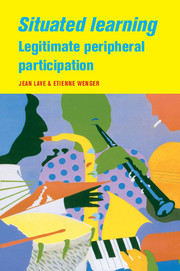All theories of learning are based on fundamental assumptions about the person, the world, and their relations, and we have argued that this monograph formulates a theory of learning as a dimension of social practice. Indeed, the concept of legitimate peripheral participation provides a framework for bringing together theories of situated activity and theories about the production and reproduction of the social order. These have usually been treated separately, and within distinct theoretical traditions. But there is common ground for exploring their integral, constitutive relations, their entailments, and effects in a framework of social practice theory, in which the production, transformation, and change in the identities of persons, knowledgeable skill in practice, and communities of practice are realized in the lived-in world of engagement in everyday activity.
INTERNALIZATION OF THE CULTURAL GIVEN
Conventional explanations view learning as a process by which a learner internalizes knowledge, whether “discovered,” “transmitted” from others, or “experienced in interaction” with others. This focus on internalization does not just leave the nature of the learner, of the world, and of their relations unexplored; it can only reflect far-reaching assumptions concerning these issues. It establishes a sharp dichotomy between inside and outside, suggests that knowledge is largely cerebral, and takes the individual as the nonproblematic unit of analysis. Furthermore, learning as internalization is too easily construed as an unproblematic process of absorbing the given, as a matter of transmission and assimilation.
